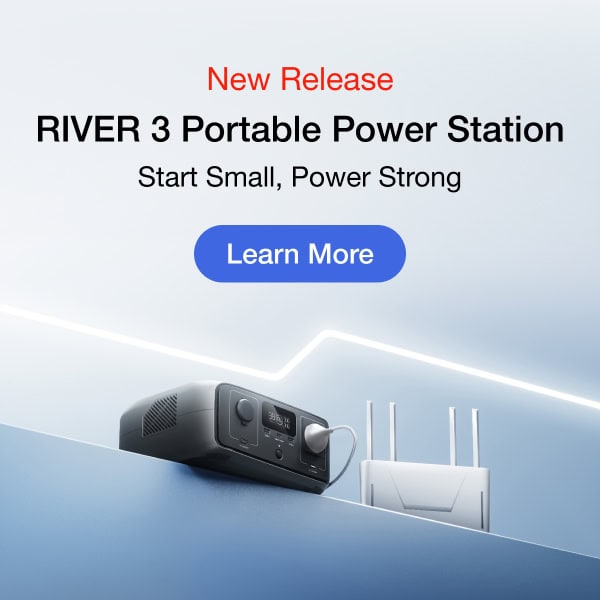When building a solar power system, sourcing and connecting the right components can get complicated. To make consumers’ lives easier, manufacturers like EcoFlow now sell solar panel kits with all the parts you need to get started included right out of the box.
Before investing in a solar panel kit, you need to know what you’re getting, how it comes together, and whether this solution makes sense for your electricity needs.
Read on to learn how a solar panel kit can work for you.
What Are Solar Power Kits?
Solar power can seem complicated at first. Fortunately, many solar kits are designed to make harnessing the sun’s renewable energy simple.
Usually, a solar panel kit contains (at minimum) photovoltaic (PV) solar panels and an inverter. The PV panels collect energy from the sun, while the inverter converts the energy from DC to AC so you can use the electric power in your home. Unless you’re investing in a grid-tied solar power system, you’ll also need a solar battery system to store the energy and make it all work.
Some solar kits combine everything you need for a fully functional solar power installation, including the solar battery, solar charge controller, inverter, and cabling. EcoFlow’s Power Kits, for example, include all the components you need to collect, store, and convert solar energy to electricity. The package saves you the time and effort of purchasing separate parts and checking compatibility. Power Kits are easy to install and get up and running quickly.
How Does a Solar Kit work?
A solar kit begins with collecting the sun’s energy. As sunlight hits your solar panels, the panels collect the sun’s energy for your system. The system then stores, converts, and transfers power to your home, motorhome, appliances, or whatever you connect the system to.
Some solar kits include everything you need for that process to run effectively. However, you need to consider how much electricity you will consume. The size of the solar kit you need for your motorhome or tiny home will differ from what you need for a camping trip or an entire house.
When you purchase a solar kit, you must determine how much power you need and ensure that your equipment will provide it. There are online tools provided by solar power kit manufacturers that can help you with these calculations by taking into account your energy needs.
Another crucial consideration is the hours of sunlight and resulting solar power generation you can expect where you live.
All of this factors into what solar power system is right for you.
Components of a Solar Panel Kit
Delivering solar energy requires more than just installing solar panels. A complete solar energy system will include components to collect, store, convert, and transfer power to your home or motorhome. If you opt for a grid-tied system, you may be able to sell any extra electricity you generate back to your utility company through net metering.
Understanding how each component functions within the system can help you when you’re making a decision about which solar panel kit to purchase.
Solar Panels
The process starts with PV solar panels collecting the sun’s energy.
Solar panels vary in conversion efficiency depending on the materials that manufacturers use. Common types of solar panels include monocrystalline, polycrystalline, and thin film.
You don’t want to skimp on solar panel quality. An experienced, reputable manufacturer is critical to getting the most from your system.
Solar Battery
If you opt for an off-grid solar panel system, you’ll need to store the sun’s energy in a solar battery.
An adequately sized solar battery ensures you’ll have sufficient electricity for when you need it most.
A common misconception about solar power is that it doesn’t work on overcast days or at night. Battery storage is the key to allowing solar energy to meet your electricity needs at any time of day or season. Having adequate storage capacity is essential if you’re going off-grid.
Inverter
Solar panels generally collect the sun’s energy as DC electricity. Your home runs on AC electricity. An inverter converts solar DC electricity to AC to power your household appliances and devices.
Cables
A solar panel kit from a reputable manufacturer will include all the cables you need to connect components. Having the right cables in your kit can save a great deal of time and frustration trying to buy them separately.
Mounting Hardware
Solar panel kits that provide mounting hardware can save you hours of time if you choose to install the system yourself.
Types of Solar Panels
Not all photovoltaic (PV) solar panels serve the same function. Depending on your specific use case, you might want panels mounted on a rooftop or travel affixed to a motorhome. The size and shape of your mounting space can similarly affect what you need.
Rigid Solar Panels
Rigid PV panels like the 400W rigid solar panels from EcoFlow are the best choice for permanent installations — especially on your rooftop. They are the heaviest, thickest, and sturdiest type of panel, built to withstand the forces of nature.
When you have a large, flat surface to place them on, these remain the gold standard for photovoltaic panel efficiency. On the other hand, they can be harder to install and don’t work well for non-flat surfaces or portable installations.
Portable Solar Panels
Sometimes you want a solar kit that you can take with you. Portable solar panels typically fold into a suitcase-style carrier. They’re convenient if you want to connect a small appliance or device on the go or even provide electricity in your motorhome when you travel. They are lightweight and easy to transport.
Flexible Solar Panels
Flexible solar panels — also commonly known as thin-film — bend and adjust to the shape of a curved surface and can be ideal for a fixed solar source on a smaller home or a vehicle. They are light and easy to install. However, they are less efficient than rigid or portable solar panels.
Is It Possible to Build Your Own Solar Panel Kit? — DIY Solar
You can DIY your solar panel kit if you choose. A DIY solar kit build typically requires purchasing separate components from several manufacturers and ensuring cross-compatibility.
While building a DIY solar panel kit may seem tempting from a costs saving perspective, ensuring every component will work well together makes it a challenging endeavour.
Compatibility
Not all solar system components work together. While EcoFlow panels are compatible with most third-party balance of system components, this is not always the case.
If you assemble a custom solar panel kit, you’ll need to research each part and ensure the entire assembly will work together seamlessly.
Quality
Manufacturing quality varies widely among suppliers. Purchasing the cheapest components is rarely the best long-term choice.
Going solar requires a substantial upfront investment. If you buy inexpensive components, you may never recoup your ROI.
Assembly
A plug-and-play solar power system — like EcoFlow’s Power Kits — makes assembly easy, even for DIY novices. Separately purchasing each component can be challenging for even an experienced handyperson.
Conclusion
EcoFlow’s Power Kits come with every component you need to build and install a solar power system for your tiny home or motorhome.
EcoFlow can help you find and purchase the best kit for your individual needs.
There’s even a free online calculator to help you determine which Power Kit is right for you.
Join the clean energy revolution today!





